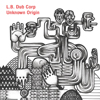L.B. Dub Corp is Luke Slater’s project based around progressive reductionism, one that has previously been well suited to the 12″ or remix, rather than full album. Over the past eight years this seldom-used moniker has built something of a cult following through infrequent and high-quality transmissions — subbed-out techno, spiked through with traditional dub signifiers: hard rhythm, slow-built tension, and disorientating synth interjection. But while the bare-bones nature of previous releases may not on paper make the prospect of a full album seem immediately compelling, here Slater rolls out an effective and significantly more detailed journey, one in which warmer house influences provide a hefty pivot point.
British poet Benjamin Zephaniah lends his distinct vocal presence to opener, “Take a Ride,” a subdued piece featuring lashing snares and prominent reverb against Slater’s big-room sheen. “Nearly Africa” is an effective pacer comprising restrained mid-range percussion, funky bass, and a spoken-word vocal ticking over subtly but never fully erupting. “Ever and Ever” acts as a neat rework of “It’s What You Feel” from the 2010 Take it Down (In Dub) EP, acidic stabs and tinkling percussion beefed up alongside the off-kilter piano and claps. This solid, rolling house influence is also present on “Generation to Generation” a smooth, piano-led groove that unfolds above another spoken-word vocal.
“Any Time Will Be OK” is perhaps the most overtly dub-influenced track on offer, with a serious level of reverb and sustain covering the mix. Elsewhere, rougher Chicago signifiers are writ large over “Turner’s House,” an unashamed tribute to the old guard that calls to mind a spruced up Gene Hunt jam. Slater sounds the only wrong note on the somewhat cheesy “No Trouble in Paradise,” a sickly, synth-laden affair that could sit comfortably on Tiësto’s no doubt diamond-encrusted USB stick.
By proxy, the closing “Roller,” featuring Function, is an absolute belter — total precision-engineered, fully committed techno. Indeed, it is arguably Luke Slater (specifically in Planetary Assault Systems guise) who has exerted the most blatant influence over the Ostgut signature sound: it would be nigh on inconceivable to imagine Dettmann, Klock et al. making the records they do without the psychic pull of myriad PAS jams. The inclusion of “Roller” as the final track acts as flick switch: the most viscerally compelling moment on the LP and the most immediately “Ostgut” — perhaps something of a neat circular influence.
Unknown Origin may not be the most arresting or original statement of intent from Slater; to my ears, the digital polish feels overbearing at times and polishing up rougher house signifiers is not necessarily the most involving way of incorporating such influences. Yet it remains a compelling enough listen, and one that moves with a dramatic pulse. Crucially, and unlike many techno LPs, it justifies its album status.
















